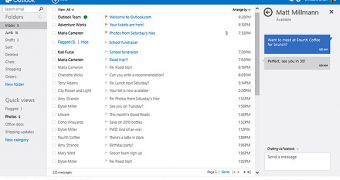Microsoft has released two new security features for its browser-based email service Outlook.com, as the number of registered users continues to grow on a daily basis.
The new support for DMARC (Domain-based Message Authentication, Reporting & Conformance) and for EV (Extended Validation) Certificates is supposed to help Microsoft protect Oulook.com users from phishing attacks.
“DMARC helps protect email sending services by giving them valuable information about mail coming from their domain. As part of DMARC, senders get reports on email that comes from their domain (good and bad), as well as how much of their traffic is passing/failing email authentication checks,” Microsoft explains.
As for the EV certificates, they are designed to protect users from phishing attacks relying on a website that “pretends to be from one company, but is actually from another,” as Microsoft explained.
EV certificate support will also be implemented in SkyDrive and some other Microsoft services in the near future, while Hotmail.com and Live.com customers get the same level of protection “while they are upgrading to Outlook.com,” according to the Redmond-based technology titan.
That’s another way of saying that Live.com and Hotmail.com users must upgrade to Outlook.com as soon as possible if they want to get the new features.
“You can easily verify the authenticity of our webpages by using the enhanced display supported by most browsers, which includes the name of the company or entity that owns the certificate--in this case Microsoft Corporation--and a distinctive green color shown in the address bar to indicate that a valid EV certificate was received,” Microsoft said.
The company has already started users’ migration from the older email services to Outlook.com and will start sending emails to urge everyone to make the switch this week.
Outlook.com currently has 25 million users, according to Microsoft’s very own data, and many new adopters are actually former Gmail fans who discovered the great feature package of this revamped email service.

 14 DAY TRIAL //
14 DAY TRIAL //